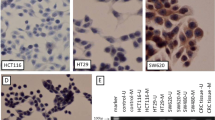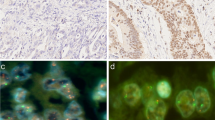Abstract
The c-erbB2 gene has been found to be amplified in a number of human adenocarcinomas, leading to elevated levels of expression of its encoded product, p185. Mutations in the p53 gene are also common in colorectal carcinomas, brain tumours, leukaemia and lymphomas.
In this study, p185 and p53 overexpression was analyzed in colorectal adenomas (22 tubular adenomas and 2 tubulo-villous adenomas) and moderately differentiated adenocarcinomas (n = 22) in order to determine whether there was a relationship between these two proteins. The proteins are encoded by two genes located in the same chromosome. p185 and p53 expression was determined on tissue sections by immunohistochemical staining procedure.
Expression of p185 was significantly higher (p < 0.01) in preneoplastic lesions (95.8% of cases) than colorectal cancer (63.6% of cases). p53 showed an inverse pattern to p185, being expressed in 58.3% of benign lesions and 72.7% of adenocarcinomas.
These results confirm that p185 overexpression is associated with the early stages of colorectal cancer, whereas p53 is associated with more advanced stages. Although there was no correlation between p185 and p53 expression in premalignant lesions and adenocarcinomas, these two proteins have an important role in the adenoma–carcinoma sequence.
Similar content being viewed by others
References
Abdel-Fattah G, Yoffe B, Krishnam B, Khaoustov V, Itani K (2000) MDM2/p53 protein expression in the development of colorectal adenocarcinoma. J Gastrointest Surg 4: 109–114.
Baker S, Fearon ER, Nigro JM, Hamilton SR, Preisinger AC, Jessup JM, Vantuinen P, Ledbetter DH, Baker DF, Nakamura Y, White R, Vogelstein B(1989) Chromosome 17 deletions and p53 gene mutations in colorectal carcinomas. Science 244: 217–221.
Bargonetti J, Friedman PN, Kern SE, Vogelstein B, Prives C (1991) Wild type but not mutant p53 immunopurified proteins bind to sequences adjacent to the SU40 origin or replication. Cell 64: 1083–1091.
Bell SM, Scott N, Cross D, Sagar P, Lewis FA, Blair GE, Taylor GR, Dixon MF, Quirke P (1993) Prognostic value of p53 overexpression and c-ki ras gene mutations in colorectal cancer. Gastroenterology 104: 57–64.
Cattoretti G, Rilke F, Andreola S, D' Amato L, Delia D (1988) p53 expression in breast cancer. Int J Cancer 41: 178–183.
Clarke AR, Purdie CA, Harrison DJ, Morris RG, Bird CC, Hooper MJ, Wyllie AH (1993) Thymocyte apoptosis induced by p53 dependent and independent pathways. Nature 362: 849–851.
Cohen JA, Weiner DB, More KF, Kokai Y, Williams WV, Maguire HJ, Livolsi VA, Greene M(1989) Expression pattern of the neu (NGL) gene encoded growth factor receptor (p185 neu) in normal and transformed epithelial tissues of the digestive tract. Oncogene 4: 81–88.
D' Emilia J, Bulovas K, D'Ercole K, Wolf B, Steele G, Summerhayes IC (1989) Expression of the c-erb B-2 gene product p185 at different stages of neoplastic progression in the colon. Oncogene 4: 1233–1239.
Digiesi G, Giacomini P, Mariani M, Nicotra MR, Segatto O (1992) Production and characterization of murine MAbs to the extracellular domain of human neu oncogene product GP185-Her2. Hybridoma 11: 519–527.
Fenoglio-Preiser CM, Pascal RR, Perzin KM (1990). In: Armed Forces Institute of Pathology. Atlas of tumor pathology. Tumors of the intestines. Washington, pp. 95–97.
Hsu SM, Raine L, Fanger H (1981) Use of avidin–biotin-peroxidase complex (ABC) in immunoperoxidase techniques: a comparison between ABC and unlabelled antibody (PAP) procedures. J Histochem Cytochem 29: 577–580.
Iggo R, Gatter K, Barter J, Lane DP, Harris AL (1990) Increased expression of mutant forms of p53 oncogene in primary lung cancer. Lancet 935: 675–679.
Jass JR, Love SB, Northover JMA (1987) A new prognostic classification of rectal cancer. Lancet I: 1303–1306.
Kastan MB, Onykwere O, Sidransky D, Vogelstein B, Craig RW (1991) Participation of p53 protein in the cellular response to DNA damage. Cancer Res 51: 6304–6311.
Kay EW, Mulcahy H, Walsh CB, Leader M, O'Donoghue D (1994) Cytoplasmic c-erbB-2 protein expression correlates with survival in Dukes' B colorectal carcinoma. Histopathology 25: 455–461.
Krans MH, Popescu NC, Amsbough SC, King CR (1987) Overexpression of the EGF receptor related protooncogene erbB-2 in human mammary tumor cell lines by different mechanisms. EMBO J 6: 605–610.
Laurent-Puig P, Olschwang S, Delattre O, Remvikos Y, Asselain B, Melot T, Validire P, Muleris M, Girodet J, Salmon RJ et al. (1992) Survival and acquired genetic alterations in colorectal cancer. Gastroenterology 102: 1136–1141.
Liu C, Park M, Tsao MS (1992) Overexpression of c-met protooncogene but not epidermal growth factor receptor or c-erbB-2 in primary human colorectal carcinomas. Oncogene 7: 181–185.
Morson BC, Sobin LH (1976) In: WHO.Histological typing of intestinal tumors. Geneva, p. 56.
Morson BC, Dawson IMP (1991) Benign epithelial tumours and polyps. In: Blackwell Scientific Publications. Gastrointestinal Pathology. Oxford, Chapter 39, pp. 566–567.
Muller WJ, Sinn E, Pattengale PK, Wallace R, Leder P (1998) Single step induction of mammary adenocarcinoma in transgenic mice bearing the activated c-neu oncogene. Cell 54: 105–115.
Natali PG, Nicotra MR, Bigotti A, Venturo I, Slamon DJ, Fendly BM, Ullrich A (1990) Expression of the p185 encoded by HER 2 oncogene in normal and transformed human tissues. Int J Cancer 45: 457–461.
Papatheodoridis GV, Kapranos N, Tzouvala M, Triantafyllou K, Elemenoglou I, Karamanolis DG (1998) p53 and bcl-2 Protein expression in rectosigmoid adenomas. Am J Gastroent 93: 1136–1140.
Pignatelli M, Stamp GWH, Kafiri G, Lane D, Bodmer WF (1992) Overexpression of p53 nuclear oncoprotein in colorectal adenomas. Int Cancer 50: 683–688.
Purdie CA, O'Grady J, Piris J, Wullie AH and Bird CC (1991) p53 expression in colorectal tumors. Am J Pathol 138: 807–813.
Remvikos Y, Laurent-Puig P, Salomon RJ, Frelay G, Dutrillaux B, Thomas G (1990) Simultaneous monitoring of p53 protein and DNA content of colorectal adenocarcinomas by flowcytometry. Int J Cancer 45: 450–456.
Rodrigues NR, Rowan A, Smith MEF, Kerr IB, Bodmer WF, Gannon JV, Lane DP (1990) p53 mutations in colorectal cancer. Proc Nat Acad Sci 87: 7555–7559.
Shaw P, Bovery R, Tardy S, Sahli R, Sordat B, Costa J (1992) Induction of apoptosis by wild-type p53 in a human colon tumor derived cell-line. Proc Natl Acad Sci USA 89: 4495–4499.
Slamon DJ, Clark GM, Wong SC, Levin WJ, Ullrich A, McGuire WL (1987) Human breast cancer: correlation of relapse and survival with amplification of the HER2/neu oncogene. Science 235: 177–182.
Slamon DJ, Godolphin W, Jones LA, Holt JA, Wong SG, Keith DE, Levin WJ, Stuart SG, Udove J, Ullrich AN, Press MF (1989) Studies of the HER-2/neu-proto oncogene in human breast and ovarian cancer. Science 244: 707–712.
Takahashi T, Nau MM, Chiba I, Birrer MJ, Ronenberg RF, Vinocour M, Levitt M, Pass H, Gazdar AF Minna JD (1989) A frequent target for genetic abnormalities in lung cancer. Science 246: 491–494.
Van den Berg FM, Tigges AJ, Schipper MEI, Den Hartog-Jager FCA, Kroes WGM, Walbommers JMM (1989) Expression of the nuclear oncogene p53 in colorectal tumors. J Pathology 157: 193–199.
Vogelstein B, Fearon ER, Hamilton SR, Kern SR, Preisinger AC, Leppert M, Nakamura Y, White R, Smits AMM, Bos JL (1988) Genetic alterations during colorectal tumor development. N Engl J Med 319: 525–532.
Venter DJ, Tuzi NL, Kuman S, Gullick WJ (1987) Overexpression of the c-erb B2 oncoprotein in human breast carcinomas: immunohistological assessment correlates with gene amplification. Lancet 2: 69–71.
Watson DS, Brotherick I, Sheuton BK, Wilson RG, Campbell FC (1999) Growth dysregulation and p53 accumulation in human primary colorectal cancer. British J Cancer 80: 1062–1068.
Zhang Hong (1999) Evaluation of four antibodies in detecting p53 protein for predicting clinicopathological and prognostic significance in colorectal adenocarcinoma. Clin Cancer Res 5: 4126–4132.
Author information
Authors and Affiliations
Rights and permissions
About this article
Cite this article
Porcelli, B., Frosi, B., Terzuoli, L. et al. Expression of P185 and P53 in Benign and Malignant Colorectal Lesions. Histochem J 33, 51–57 (2001). https://doi.org/10.1023/A:1017543930661
Issue Date:
DOI: https://doi.org/10.1023/A:1017543930661




